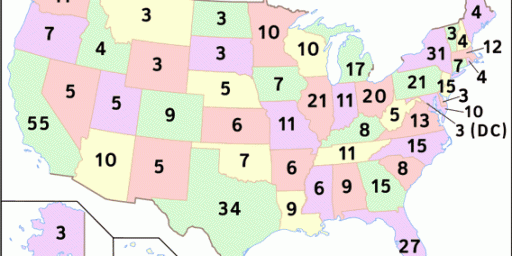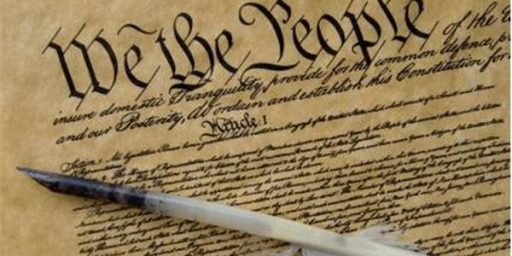CONSTITUTIONAL MYTHS
Eugene Volokh has an interesting piece on the 1st Amendment and what he terms the fallacy of original intent on National Review Online.
For most of American history, speech was less constitutionally protected than it is today. There was never a time when “no law” meant “no law” and all speech was protected.
In the late 1700s, it wasn’t even clear whether the First Amendment covered criminal punishment for politically incorrect speech. Many people argued that it applied only to “prior restraints,” such as injunctions or prepublication censorship rule. Laws criminalizing speech after it’s published, the argument went, were perfectly constitutional – even if, for instance, the laws banned criticism of the government. Only in the 1930s was it firmly settled that the First Amendment protects speech against criminal punishment.
In the late 1700s and early 1800s, courts routinely held that some antigovernment speech – even speech that wasn’t directly inciting crime – was constitutionally unprotected. In many states, until the 1810s and 1820s truth wasn’t a defense to criminal libel prosecutions. Even when it became a defense, it generally applied only when the statement was made with “good motives” and for “justifiable ends,” however a judge or jury chose to interpret these vague phrases. Those limitations weren’t eliminated until the 1960s.
***
This also shows the error of faulting liberal judges for “making up the law” in this area. Unfortunately, the First Amendment is so general that judges have to create legal rules that turn the broad words into concretely applicable law. Judges can’t just rely on the text. They can’t just rely on the original meaning, which is highly ambiguous. (As I mentioned, the Framers didn’t even agree whether the First Amendment applied to subsequent punishments, or only to prior restraints.)
One can criticize judges for just making up constitutional guarantees that aren’t mentioned in the Constitution at all. But here the Constitution does say something — but something very general. If it’s to be enforced at all, judges have to give it specific meaning. And that’s been part of our constitutional tradition since shortly after the Framing. Conservative and liberal judges alike have done this, as to various constitutional provisions, because they have to do it.
Kevin Drum cites the piece and largely agrees with it.
Generally speaking, I’ve never felt that strict constructionism or original intent made much sense as analytical tools in the area of constitutional law. The constitution simply doesn’t address a lot of current problems, and in any case trying to divine the intent of the framers 200 years ago is arguably even harder and more open to interpretation than considering current law and circumstances. Besides, why exalt the intent of the framers anyway? After all, these are the same guys who thought that outlawing blasphemy was perfectly OK regardless of what the Bill of Rights said, and I can’t think of any reason why their view on this matter should be given any more weight than our own.
Eugene’s historical analysis is, of course, correct. Of course, most of that stemmed from the fact that the 1st Amendment begins “Congress shall make no law….” [emphasis added.] Restrictions by the states were considered perfectly fine until the Supreme Court began incorporating parts of the Bill of Rights via the 14th Amendment.
I agree that strict construction is virtually impossible for some issues, especially where technology has rendered old distinctions moot. But at what point do we move to the Constitution being a completely meaningless document, meaning literally whatever a majority of the unelected judges on any given court think at any given moment?






The Framers took the long view. They created for the ages and they had a sense of that. They were terrified and exalted. Who today, even among those I support, has that long view and passion. I still trust them. There will have to be, as there already have been, accomodation for changing circumstances. But I think every tiniest change should be dragged kicking and screaming from that great document. It should be given every opportunity to defend itself. If a change is truly needed, it will come – eventually. But not overnight, as a stroke from one arm of a three arm system.
—